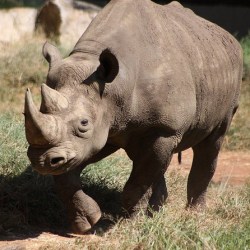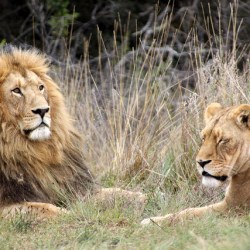News
We bring you the latest from around the World in wildlife and conservation news.
Zimbabwe To Re-Introduce Rhinos Into National Parks
Zimbabwe is set to reintroduce rhinos into its second largest national park despite the fact that elephant poaching in the Gonarhezhou reserve surges. The park which measures 5,053 square-kilometers will introduce 40 black rhinos over two years according to , Hugo van der Westhuizen of the Frankfurt Zoological Society which is working with the Zimbabwean authorities on the project.
Lions To Return To Rwanda after Twenty Year Absence
After an absence of over two decades lions are set to return to Rwanda according to wildlife officials. The country’s population of the endangered species was completely wiped out following the genocide that took place in Rwanda in 1994. The first intake of lions will include five females and two males which are being transported from South Africa to the Eastern Akagera National Park.
IUCN Warns That Thousands Of Species At Risk Of Extinction
A top conservation body is warning that there are almost 23,000 species that are at risk of going extinct including the world’s rarest sea lion as well the mighty African lion. The International Union for the Conservation of Nature (IUCN) has updated its “Red List” of threatened species which has also shown some clear improvements in conservation of endangered species such as the Iberian Lynx. However the agency is warning that the number of successes has been dwarfed by a large number of declines in a range of species.
Study Shows Kangaroos Are Left Handed
A new study suggests that kangaroos in the wild tend to prefer using their left hands when performing common tasks such as feeding and grooming. The researchers arrived at their conclusion after spending many hours observing multiple wild species. They found two kangaroo species and one species of wallaby displaying a left handed tendency. Other species of marsupials which walk on all fours did not display the same tendency.
Japanese Zoos And Aquariums Pledge To Stop Purchasing Live Dolphins From Taiji
Despite intense criticism of the hunting technique used, a news report says that roughly half of the live dolphins captured in the Japanese coastal town of Taiji were exported to China and other countries. The method is known as the “drive hunt” and has been criticised around the world as cruel. The criticism was so intense that many Japanese zoos and aquariums were forced to pledge to refrain from buying animals captured through the controversial technique.
The Last Surviving Central London Hedgehogs
Only a few hedgehogs remain in a central London park and they have managed to survive because they have learned to avoid busy roads according to the results of a new study. The species used to be extremely common throughout the UK but over the last 60 years their numbers have declined steeply largely as a result of road deaths.
New York State Supreme Court To Decide Whether Chimps Have Human Rights
Whilst they won’t be getting suited and booted any time soon, two chimpanzees may finally get their day in court. It is expected that the New York State Supreme Court will he legal arguments regarding whether two research chimps named Leo and Hercules should have the same rights as humans and under the law be set free rather than be considered as property.
Dogs Split From Wolves Much Earlier Than Previously Thought
A new study indicates that humans befriended dogs well before we began farming and settled in villages over 10,000 years ago. Recently an ancient wolf bone was discovered in Siberia which suggests that dogs and wolves split from a common ancestor as far back as 27,000 years ago. And whilst researchers are quick to point out that separation and domestication are not quite the same thing, it does mean it is possible that domestication occurred much earlier than was previously thought.






